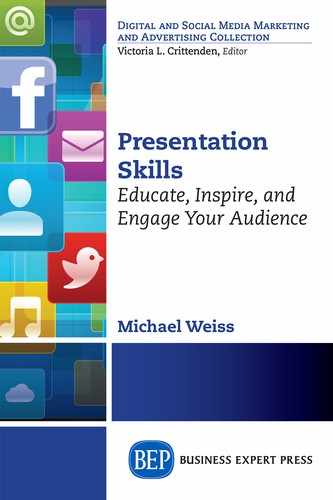When you are content to simply be yourself and don’t care or compete, everybody will respect you.
—Lao Tzu
One of the most sincere forms of respect is actually listening to what another has to say.
—Bryant H. McGill
While you are reading this book through the eyes of a presenter, chances are you will be in the audience many more times in your life than you will be on stage. This is extremely important to remember because it puts everything into perspective. As an audience member you have wishes, wants, and needs. You have expectations to be educated, inspired, and engaged. And most importantly, you are human. You can be easily distracted, you have feelings and opinions, and sometimes you get bored. Knowing this as a presenter is critical because you have to respect the audience as if each member is just like you. I talk a lot about respect throughout the book because I believe it is the most important trait a speaker can possess. The more you respect your audience, the more you will hold their attention. The more you treat them the way you want to be treated, the better chance you have of enlightening them. Respecting the audience can be as simple as not going over your allocated time or as complex as choosing a subject matter that will motivate them. However you choose to do it, respect your audience and they will, in turn, respect you.
Quick Exercise #1
I want you to put this book down. Wait! Hold on! Do not put it down until I tell you what I want you to do! Find a random person in your office, on the train, or the person seated next to you on the plane, and tell that person a story about the first time you went to Disneyland. If you have never been to Disneyland, tell them about the first rock concert you ever attended. The reason behind telling a personal story is because I want you to focus on how you tell it and not have to think about the content. So choose a story you have told 100 times; a story that is almost second nature.
As you tell the story, pay attention to how you feel. Nervous? Excited? Passionate? Are you able to weave a compelling tale or are you just stating facts? Take notice of the other person’s body language and eyes. Does your listener seem interested? Bored? Did you get a laugh at the right time? An ooh or ah when you expected it? Did they ask you questions?
The objective with this exercise is to get a baseline on your storytelling ability and establish if you can engage an audience (even if it is one person) with a simple, personal story about yourself.
I perform this exercise all the time. It helps me to better read my audience and to know if I need to change up my story to make it more engaging. I begin all of my Presentation Elevation workshops with this exercise because it sets the bar for each participant because it shows them, in a matter of minutes, where they need to improve.
